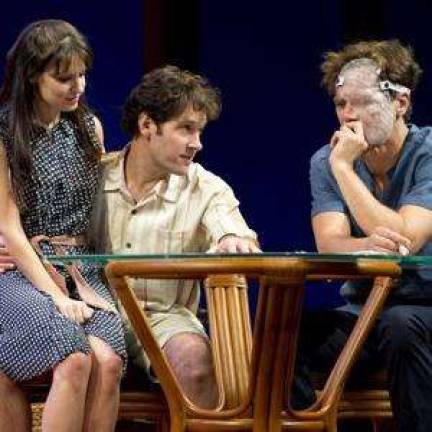"Grace" Notes: Theater Beyond Belief

Questions of faith in a higher power have fueled dramatic storytelling ever since Abraham first ascended Mount Moriah. Is there a God? What does it mean to be a "good" person, and if such a life exists, will it be rewarded? These are searing questions that over time have borne delicious fruit. Craig Wright's Grace, which just landed on Broadway after nearly a decade of gestation in regional theaters beginning with Washington's Woolly Mammoth Theater, is the latest to try and wring some sap from this fertile giving tree. He must feel very hungry. In Dexter Bullard's disengaged production, Grace offers a quartet of sad souls stuck in limbo ? emotionally, as well as geographically. Paul Rudd is Steve, a "believer" ? those are his own words ? who has moved himself and wife Sara (Kate Arrington) from Minnesota to Florida in order to start a chain of gospel-themed hotels. The slogan, "Where would Jesus stay?," gets a big laugh, and makes one wish that Wright and Bullard had fashioned a more irreverent, comedic tone to underscore the formulaic turn of events to come, instead of a play that strips the deepest of themes and emotions to the most elementary of concepts. Alas, Wright ? himself a former seminary student ? has heavier themes in store. These won't come as a surprise, since he beats his audience over the head with them from the play's beginning, using an in medias res structural device used so often in the television world from which Wright hails (Six Feet Under) that it has already become a trope. Sara and Steve meet their hermit-like neighbor, Sam (Michael Shannon), a NASA employee whose fiancée was killed in a gruesome car crash that has disfigured his face, Phantom of the Opera-style. Though the two live next door, the actors share the same walking space at all times on Beowulf Boritt's slowly revolving Florida ranch house set. Bullard and Wright literally march their actors march backwards and forwards through his faith-versus-science exercise, which hits all the predictable notes as business problems unhinge Steve. That an aimless Sara begins spending her days in Sam's house don't help Steve either, though it seems to do wonders for Sam. Wright has a premise ? is God watching us on Earth or not? ? but not a full plot, and his emphasis on stereotypes provides a stumbling block for Rudd, who is forced to play down his skills as an observer and can't chart Steve's growing volatility in a believable way. One also longs for more of a wonderful Ed Asner, making a long-overdue return to the stage. But his character, an exterminator named Karl, is reduced to a pair of scenes in which he cites two of the most cliché-ridden "Why God?" theatricalities there are, cancer and the Holocaust. Maybe because his Broadway debut marks something of a family affair for Shannon (Arrington is his real-life partner, and Bullard and Wright are friends and frequent past collaborators), however, the awkward-looking actor makes Sam an arresting distillation of solitude and suffering. Arrington navigates Sara's ennui gracefully, and the two connect beautifully as Sam and Sara discuss what faith means to each of them. Otherwise, however, these characters feel like pawns in Wright's game, chess pieces used to drive Grace to its (anti)climax. Events escalate in what feels like a foregone path. They feel mechanical, de rigeur; characters' choices and fates are unearned. Wright's choice to bookend his play's beginning and end with the same unilluminating scene is what ultimately does the show in, ridding Grace of both substance and suspense. We get it: bad things happen, it isn't fair, and it makes people upset. Grace is evergreen material made stale. This one takes quite a fall. Grace Cort Theater, 138 West 48th Street. http://www.graceonbroadway.com/ Through Jan. 6.